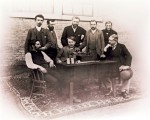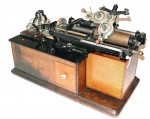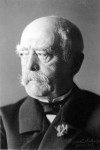 Researchers at the Thomas Edison National Historical Park have discovered that 17 unlabeled wax cylinder phonograph records found stashed in a cabinet behind Edison’s cot back in 1957 contain extremely rare recordings made in Europe in 1889 and 1890, including the only known recording of Otto von Bismarck, first Chancellor of the German Empire.
Researchers at the Thomas Edison National Historical Park have discovered that 17 unlabeled wax cylinder phonograph records found stashed in a cabinet behind Edison’s cot back in 1957 contain extremely rare recordings made in Europe in 1889 and 1890, including the only known recording of Otto von Bismarck, first Chancellor of the German Empire.
Two [of the wax cylinders] preserve the voice of Helmuth von Moltke, a venerable German military strategist, reciting lines from Shakespeare and from Goethe’s “Faust” into a phonograph horn. (Moltke was 89 when he made the recordings — the only ones known to survive from someone born as early as 1800.) Other records found in the collection hold musical treasures — lieder and rhapsodies performed by German and Hungarian singers and pianists at the apex of the Romantic era, including what is thought to be the first recording of a work by Chopin.
Since they weren’t labeled or cataloged, nobody had any idea what was on them until last year when Edison laboratory curator Jerry Fabris used an Archeophone device to trace the grooves on 12 of the cylinders and convert them to audible wav files. The recordings were very faint, too faint for Fabris to identify, so he enlisted the aid of sound historians Patrick Feaster of Indiana University and Stephan Puille of the University of Applied Sciences in Berlin to try to determine who and what were on the cylinders.
 They had a starting point: the words “Wangemann. Edison” carved into the lid of the wooden container in which the cylinders had been found. Adelbert Theodor Edward Wangemann had been hired by Edison in 1888 to market his newly invented wax cylinder phonograph. Wangemann quickly became adept at recording with the phonograph and was sent to Europe in June of 1889 to supervise the operation of the Edison phonographs on exhibit at the Paris World’s Fair.
They had a starting point: the words “Wangemann. Edison” carved into the lid of the wooden container in which the cylinders had been found. Adelbert Theodor Edward Wangemann had been hired by Edison in 1888 to market his newly invented wax cylinder phonograph. Wangemann quickly became adept at recording with the phonograph and was sent to Europe in June of 1889 to supervise the operation of the Edison phonographs on exhibit at the Paris World’s Fair.
The assignment was only supposed to last two weeks, but after the World’s Fair was over Edison expanded his brief and allowed him to travel Europe collecting quality recordings to use for exhibitions. After Paris he went to his native country of Germany where he set up displays of the technology for scientists and luminaries. In Berlin, Wangemann set up his equipment in a room loaned to him by the Siemens Corporation. He carried the cylinders and accessories to the exhibition room in a lockable wooden box. It’s that box that was discovered back at Edison’s New Jersey lab in 1957.
 Edison joined Wangemann in Germany to make a splash during the phonograph exhibits to scientists. While he was there, Edison asked to meet the three most important people in Germany, Bismarck, von Moltke and Kaiser Wilhelm II, but none of them were available. They all replied that they wanted to see the phonograph, though, so Edison sent Wangemann to show them the new toy and get their voices recorded for posterity. He did meet with them all, but although Wilhelm II greatly enjoyed Wangemann’s musical recordings, he never did get his own voice carved in wax. Three of his sons, the eldest just seven years old, did get recorded.
Edison joined Wangemann in Germany to make a splash during the phonograph exhibits to scientists. While he was there, Edison asked to meet the three most important people in Germany, Bismarck, von Moltke and Kaiser Wilhelm II, but none of them were available. They all replied that they wanted to see the phonograph, though, so Edison sent Wangemann to show them the new toy and get their voices recorded for posterity. He did meet with them all, but although Wilhelm II greatly enjoyed Wangemann’s musical recordings, he never did get his own voice carved in wax. Three of his sons, the eldest just seven years old, did get recorded.
 In Friedrichsruh on Oct. 7, 1889, Wangemann recorded Chancellor Otto von Bismarck reciting verses from several ditties in four languages. The first is “In Good Old Colony Times,” a British folk song that was altered after the American Revolution to give it an anti-monarchist spin. The second is “Als Kaiser Rotbart lobesam” (When good Emperor Redbeard), an 1814 German heroic ballad by Ludwig Uhland about Emperor Frederick I Barbarossa going on the Third Crusade. The third is the Latin song “Gaudeamus igitur,” a popular graduation song in Europe at the time with your classic “carpe diem” message. The fourth is the first verse of “La Marseillaise,” which is something of an enormous iceburn on the French given their ignominious defeat by Bismarck’s Prussia in the Franco-Prussian War of 1870–71.
In Friedrichsruh on Oct. 7, 1889, Wangemann recorded Chancellor Otto von Bismarck reciting verses from several ditties in four languages. The first is “In Good Old Colony Times,” a British folk song that was altered after the American Revolution to give it an anti-monarchist spin. The second is “Als Kaiser Rotbart lobesam” (When good Emperor Redbeard), an 1814 German heroic ballad by Ludwig Uhland about Emperor Frederick I Barbarossa going on the Third Crusade. The third is the Latin song “Gaudeamus igitur,” a popular graduation song in Europe at the time with your classic “carpe diem” message. The fourth is the first verse of “La Marseillaise,” which is something of an enormous iceburn on the French given their ignominious defeat by Bismarck’s Prussia in the Franco-Prussian War of 1870–71.
The last lines Bismarck speaks are a direct appeal to his son Herbert who would listen to it on a phonograph in Budapest a few weeks later and recognize his father’s voice. “Do everything in moderation and morality, namely work, but then also eating, and apart from that especially drinking. Advice of a father to his son.” Solid Junker advice, that.
[audioplayer file=”http://www.thehistoryblog.com/wp-content/uploads/2012/01/OttovonBismarck.mp3″ titles=”RUN, RUN FOR YOUR LIFE”]
Read about all of the newly converted Edison/Wangemann wax cylinders, listen to the recordings and read the original text and transcripts of the spoken parts on the National Park Service website.
I appreciated your writing.
you must have thought of the subject to write.
I want you to know that I enjoyed your blog.
I will keep reading later.
Jay ^^
Just s small edification: a mistake was made translating the title of the second song: Die Schwäbische Kunde. Kunde in the feminin mode in German means news and not customer. A female customer would be: Kundin.
Thank you for the correction, Anna. I actually changed the title to the first line of the poem since that’s how most other news outlets are referring to it. :thanks: